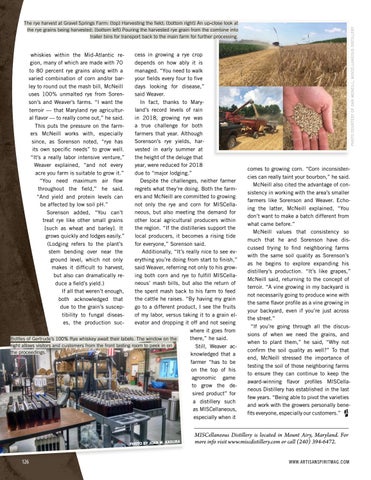cess in growing a rye crop depends on how ably it is managed. “You need to walk your fields every four to five days looking for disease,” said Weaver. In fact, thanks to Maryland’s record levels of rain in 2018, growing rye was a true challenge for both farmers that year. Although Sorenson’s rye yields, harvested in early summer at the height of the deluge that year, were reduced for 2018 due to “major lodging.” Despite the challenges, neither farmer regrets what they’re doing. Both the farmers and McNeill are committed to growing not only the rye and corn for MISCellaneous, but also meeting the demand for other local agricultural producers within the region. “If the distilleries support the local producers, it becomes a rising tide for everyone,” Sorenson said. Additionally, “It’s really nice to see everything you’re doing from start to finish,” said Weaver, referring not only to his growing both corn and rye to fulfill MISCellaneous’ mash bills, but also the return of the spent mash back to his farm to feed the cattle he raises. “By having my grain go to a different product, I see the fruits of my labor, versus taking it to a grain elevator and dropping it off and not seeing where it goes from there,” he said. Bottles of Gertrude’s 100% Rye whiskey await their labels. The window on the right allows visitors and customers from the front tasting room to peek in on Still, Weaver acthe proceedings. knowledged that a farmer “has to be on the top of his agronomic game to grow the desired product” for a distillery such as MISCellaneous, especially when it whiskies within the Mid-Atlantic region, many of which are made with 70 to 80 percent rye grains along with a varied combination of corn and/or barley to round out the mash bill, McNeill uses 100% unmalted rye from Sorenson’s and Weaver’s farms. “I want the terroir — that Maryland rye agricultural flavor — to really come out,” he said. This puts the pressure on the farmers McNeill works with, especially since, as Sorenson noted, “rye has its own specific needs” to grow well. “It’s a really labor intensive venture,” Weaver explained, “and not every acre you farm is suitable to grow it.” “You need maximum air flow throughout the field,” he said. “And yield and protein levels can be affected by low soil pH.” Sorenson added, “You can’t treat rye like other small grains [such as wheat and barley]. It grows quickly and lodges easily.” (Lodging refers to the plant’s stem bending over near the ground level, which not only makes it difficult to harvest, but also can dramatically reduce a field’s yield.) If all that weren’t enough, both acknowledged that due to the grain’s susceptibility to fungal diseases, the production suc-
KASURA PHOTO BY JOAN M.
126
PHOTO COURTESY OF DAN MCNEILL, MISCELLANEOUS DISTILLERY
The rye harvest at Gravel Springs Farm: (top) Harvesting the field; (bottom right) An up-close look at the rye grains being harvested; (bottom left) Pouring the harvested rye grain from the combine into trailer bins for transport back to the main farm for further processing.
comes to growing corn. “Corn inconsistencies can really taint your bourbon,” he said. McNeill also cited the advantage of consistency in working with the area’s smaller farmers like Sorenson and Weaver. Echoing the latter, McNeill explained, “You don’t want to make a batch different from what came before.” McNeill values that consistency so much that he and Sorenson have discussed trying to find neighboring farms with the same soil quality as Sorenson’s as he begins to explore expanding his distillery’s production. “It’s like grapes,” McNeill said, returning to the concept of terroir. “A vine growing in my backyard is not necessarily going to produce wine with the same flavor profile as a vine growing in your backyard, even if you’re just across the street.” “If you’re going through all the discussions of when we need the grains, and when to plant them,” he said, “Why not confirm the soil quality as well?” To that end, McNeill stressed the importance of testing the soil of those neighboring farms to ensure they can continue to keep the award-winning flavor profiles MISCellaneous Distillery has established in the last few years. “Being able to pivot the varieties and work with the growers personally benefits everyone, especially our customers.”
MISCellaneous Distillery is located in Mount Airy, Maryland. For more info visit www.miscdistillery.com or call (240) 394-6472. WWW.ARTISANSPIRITMAG.COM
